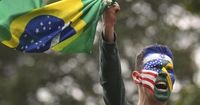Brazil’s Independence Day on September 7, 2025, became a flashpoint for the country’s deep political divide, as tens of thousands of supporters of former president Jair Bolsonaro flooded the streets in cities across the nation. The demonstrations, which played out in Sao Paulo, Rio de Janeiro, and Brasilia, were a vivid display of the enduring strength of Bolsonaro’s right-wing movement—even as the former leader faces a Supreme Court verdict that could send him to prison for decades.
The energy was palpable in Sao Paulo, where a research group from Sao Paulo University estimated around 40,000 Bolsonaro supporters gathered, waving Brazilian and American flags and chanting slogans against the Supreme Court. According to FRANCE 24, the crowd size matched previous rallies this year, though it was a far cry from the hundreds of thousands Bolsonaro could once summon at the height of his influence. Still, the core of his base remains fiercely loyal. As former military officer Suieton Souza, draped in a sarong blending the American and Brazilian flags, declared on Copacabana Beach in Rio, “If he (Bolsonaro) had wanted to stay in power, he would have been successful. Brazilians need to wake up.”
Bolsonaro, who is currently under house arrest, stands accused of orchestrating a coup attempt to retain power after his 2022 defeat to Luiz Inácio Lula da Silva. The Supreme Court’s verdict is expected by the end of the week, and many on both sides see conviction as inevitable. If found guilty, Bolsonaro could face more than 40 years in prison, as reported by The New York Times. Yet, the looming legal consequences have only galvanized his supporters, who accuse the court—particularly Justice Alexandre de Moraes, the case’s rapporteur—of political persecution.
Bolsonaro’s legal woes extend beyond Brazil’s borders, with international ramifications that have further inflamed passions. U.S. President Donald Trump has openly criticized the prosecution, imposing a 50% tariff on Brazilian imports and sanctioning Justice de Moraes under the Magnitsky Act. Trump’s actions, intended to pressure Brazilian authorities to drop the charges, have instead fueled anti-American sentiment among Lula’s supporters and underscored the stakes for Brazil’s sovereignty. President Lula, in a televised address on the eve of Independence Day, responded with defiance: “We are not, and will never again be, anyone’s colony. We do not accept orders from anyone.”
The symbolism at Sunday’s protests was hard to miss. In Sao Paulo, an enormous American flag was passed over the heads of Bolsonaro supporters, while in Brasilia, one protester donned a Trump mask for photos. Vendors in Rio sold shirts emblazoned with Trump’s image and the word “Magnitsky.” The alliance between Bolsonaro’s movement and Trump’s America was on full display, a testament to the global dimensions of Brazil’s political crisis.
Despite being barred from running for office until 2030 following a 2023 electoral court ruling, Bolsonaro’s political future remains a rallying point for his base. His eldest son, Sen. Flávio Bolsonaro, wore a shirt reading “Bolsonaro 2026,” a clear signal of the family’s determination to remain in the political spotlight. Michelle Bolsonaro, the former president’s wife, delivered an emotional speech in Sao Paulo, telling the crowd, “He loves his nation and his people, but he is suffering. I tell him every day that he will win. I believe and I trust in God’s answer to our nation.”
The mood at the pro-Bolsonaro rallies was a mix of festivity and outrage. Vendors hawked skewered meat, popcorn, and beer, while political leaders railed against the Supreme Court and what they called the “witch hunt” against Bolsonaro. Sheila Santos, a retired police officer attending the protest in Brasilia, captured the sentiment: “Unfortunately, we know he will be unfairly convicted. This is our hope now,” she said, referring to the push for amnesty.
Indeed, the question of amnesty has become central to Brazil’s political debate. As The New York Times notes, Congress is now considering legislation that would grant amnesty to Bolsonaro and others involved in the post-election turmoil, potentially sparing him from prison while ensuring he remains barred from office. The issue is especially sensitive given Brazil’s history: during the military dictatorship from 1964 to 1985, officials were granted amnesty for serious crimes, including torture and disappearances. For many Brazilians, the prospect of repeating that history is deeply troubling.
On the other side of the political spectrum, Lula’s supporters staged smaller but passionate demonstrations in defense of the Supreme Court and the rule of law. In Rio de Janeiro, Ana Baldas, a retired psychoanalyst, voiced her opposition to both Trump’s intervention and the idea of amnesty: “It’s absurd. He can’t dictate what we do in our country,” she said of Trump. Baldas, like many on the left, hopes that any amnesty measure would be vetoed or overturned, ensuring Bolsonaro faces justice. “We’ll end up with Bolsonaro being in prison anyway, and things will calm down. At least that’s my most optimistic hope.”
The dueling protests underscored the stark divisions in Brazilian society. While Bolsonaro’s supporters see him as a victim of political persecution and hold out hope for a political comeback—perhaps with help from allies abroad—his opponents are determined to see the rule of law upheld and fear a return to the impunity of the past. The presence of American flags and Trump paraphernalia at the pro-Bolsonaro rallies was met with equal parts admiration and anger, depending on which side of the divide one stood.
President Lula, for his part, has tried to shift the focus of Independence Day to themes of sovereignty and national pride, warning against foreign interference. At the traditional military parade in Brasilia, which saw fewer Bolsonaro supporters than in years past, Lula and his allies emphasized Brazil’s independence and the importance of respecting the country’s democratic institutions. As Maria do Socorro Santos, a Lula supporter, put it: “It is amazing that they have the guts to come out to defend Bolsonaro and ask Congress to pardon him when Trump imposes tariffs to hurt us just because they are friends.”
As the Supreme Court prepares to deliver its verdict, the fate of Jair Bolsonaro hangs in the balance. The coming days will test not only the resilience of Brazil’s democracy but also the ability of its leaders and citizens to bridge the divides that have brought the nation to the brink. For now, both sides are digging in, convinced that the future of Brazil—and perhaps even its sovereignty—rests on what happens next.





